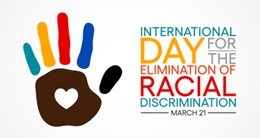The International Day for the Elimination of Racial Discrimination

by Julia White, Associate Professor, School of Education
60 Years of Efforts to Eradicate Racism
On March 21, 1960, over 5,000 people gathered peacefully at a police station in the township Sharpeville, near Johannesburg, South Africa, to protest the pass laws of apartheid South Africa. Pass laws were a tool of apartheid; Black South Africans had to carry pass books, which violated their human rights by restricting their movement. Without warning, police opened fire on these peaceful protesters, wounding almost 238 people and killing over 90 people.
Responding to this massacre, along with colonialism and acts of racism and antisemitism, the United Nations drafted the International Convention on the Elimination of All Forms of Racial Discrimination (ICERD), which it adopted in 1965. For sixty years the world has observed the International Day for the Elimination of Racial Discrimination on March 21. Although the ICERD exists to fight racial discrimination, the past sixty years have demonstrated that this fight is far from over. This day is more relevant—and urgent—than ever. Systemic racism, xenophobia, and racial violence persist across the globe—in policing, criminalizing immigrants, environmental justice/ climate colonialism, gender inequities, Indigenous land dispossession, economic disparities, access to education and healthcare, and political oppression.
This year also marks the beginning of the Second International Decade for People of African Descent, which will continue efforts “to take concrete actions to confront the legacies of enslavement and colonialism, deliver reparatory justice, and secure the full human rights and freedoms of people of African descent worldwide.”
To recognize the International Day for the Elimination of Racial Discrimination and the start of the Second International Decade for People of African Descent, the Atrocity Studies and the Practices of Social Justice minor planned two days of activities. On Thursday, March 20, at 5 pm in Bird Library, Dr. James Waller gave the Atrocity Studies Lecture, Becoming Evil: How Ordinary People Commit Mass Atrocity. He discussed the internal and external factors that can lead ordinary people to commit mass atrocities if left unchecked and unexamined as well as factors that can prevent atrocity crimes.
On Friday, March 21, we hosted an all-day series of campus-wide events to mark the International Day for the Elimination of Racial Discrimination. These events included a Genocide Prevention Workshop with Dr. James Waller; a lecture by Dr. Sherri Williams, Representation Revolution: Black Twitter’s Lasting Impact on Television; tabling by student organizations that address human rights and antiracism; open houses at 113 Euclid (Native Student Program), the Barner-McDuffie House, the Disability Cultural Center, and the LGBTQ+ Resource Center, PARCC, and CODE^SHIFT. We also highlighted the Joiri Minaya: Unseeing the Tropics at the Museum exhibit at the Emily and Joe Lowe Galleries, Shaffer Art Building.
Additionally, there was an Instagram passport raffle during the day. Students who followed us on Instagram at @SUatrocitystudies, took a picture at the International Day for the Elimination of Racial Discrimination events, and tagged us in the pictures were counted as an entry into a raffle for a bundle of books by Dr. Jim Waller and a Collegetown Bagels gift card.
We would like to highlight a reading list from the Libraries’ collections that highlight the intersections of racism, colonialism, human rights and resistance. Racial discrimination is not an abstract concept—it is embedded in the very fabric of global policies, systems and structures. The first three highlighted titles are authored by Syracuse University faculty.
- A Place We Call Home: Gender, Race, and Justice in Syracuse, K. Animashaun Ducre, 2013, Syracuse University Press.
- This book examines the intersection of race, gender, environmental justice, housing inequities, economic disparities, and systemic discrimination in Syracuse.
- Confronting Climate Coloniality: Decolonizing Pathways for Climate Justice, Farhana Sultana, 2024, Routledge.
- This book explores the deep connections of racial discrimination, colonial oppression, and climate injustice, particularly in the Global South.
- Development in Modern Africa: Past and Present Perspectives, edited by Maurice Shanguhyia and Toyin Falola, 2020, Routledge.
- This book explores the historical and contemporary challenges facing African nations in their pursuit of economic, political, and social justice, including systemic inequalities and colonial legacies, racialized policies of extraction and exploitation, the persistence of negative stereotypes, and the resilience and agency of African nations in addressing these challenges and dismantling discriminatory systems.
- A Troubled Sleep: Risk and Resilience in Contemporary Northern Ireland, James Waller, 2021, Oxford University Press.
- This book delves into the ongoing consequences of Northern Ireland’s conflict, analyzing how historical divisions rooted in ethnic and religious discrimination, segregation, and violence, persist even after the formal “end” of the conflict and how communities address the risks of rekindling past hostilities.
- Sharpeville: An Apartheid Massacre and Its Consequences, Tom Lodge, 2011, Oxford University Press.
- This book provides a detailed historical account of the Sharpeville Massacre, examining the brutal reality of apartheid, the events leading up to the massacre, and its significance in shaping international responses to South Africa’s racial policies.
- Bad Medicine: Settler Colonialism and the Institutionalization of American Indians, Sarah A. Whitt, 2025, Duke University Press.
- This book investigates how settler institutions—boarding schools, asylums, factories, and hospitals—functioned as tools of settler colonialism to control, exploit, and assimilate/ erase Native American populations in the late 19th and 20th centuries, highlighting how past injustices continue to shape the present and the resistance of Indigenous communities in navigating and challenging the impact of these oppressive systems.
- “A Problem from Hell”: America and the Age of Genocide, Samantha Power, 2013, Basic Books.
- This book explores how the U.S. and other global powers have historically failed to prevent genocide, from the Holocaust to Rwanda, often due to racial, ethnic, and political discrimination and racism. It serves as both a critique of global inaction and a call to recognize racism as a driving force behind large-scale human rights abuses and mass atrocities.
